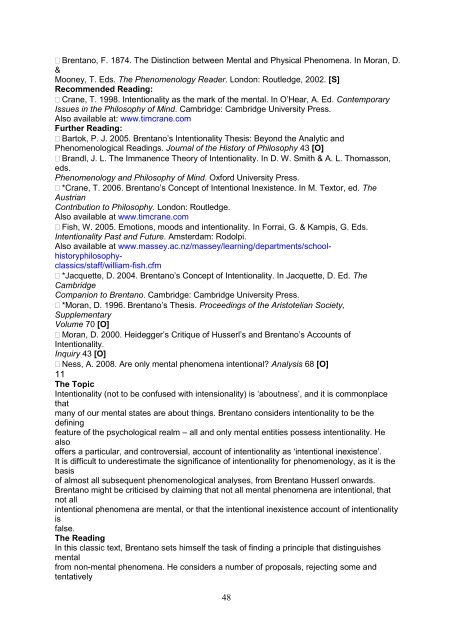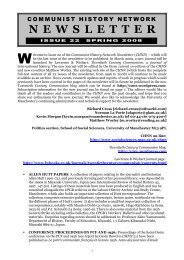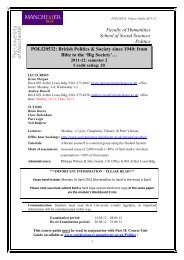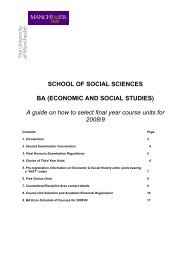second year course outlines 2012-2013 - School of Social Sciences ...
second year course outlines 2012-2013 - School of Social Sciences ...
second year course outlines 2012-2013 - School of Social Sciences ...
You also want an ePaper? Increase the reach of your titles
YUMPU automatically turns print PDFs into web optimized ePapers that Google loves.
Brentano, F. 1874. The Distinction between Mental and Physical Phenomena. In Moran, D.<br />
&<br />
Mooney, T. Eds. The Phenomenology Reader. London: Routledge, 2002. [S]<br />
Recommended Reading:<br />
Crane, T. 1998. Intentionality as the mark <strong>of</strong> the mental. In O’Hear, A. Ed. Contemporary<br />
Issues in the Philosophy <strong>of</strong> Mind. Cambridge: Cambridge University Press.<br />
Also available at: www.timcrane.com<br />
Further Reading:<br />
Bartok, P. J. 2005. Brentano’s Intentionality Thesis: Beyond the Analytic and<br />
Phenomenological Readings. Journal <strong>of</strong> the History <strong>of</strong> Philosophy 43 [O]<br />
Brandl, J. L. The Immanence Theory <strong>of</strong> Intentionality. In D. W. Smith & A. L. Thomasson,<br />
eds.<br />
Phenomenology and Philosophy <strong>of</strong> Mind. Oxford University Press.<br />
*Crane, T. 2006. Brentano’s Concept <strong>of</strong> Intentional Inexistence. In M. Textor, ed. The<br />
Austrian<br />
Contribution to Philosophy. London: Routledge.<br />
Also available at www.timcrane.com<br />
Fish, W. 2005. Emotions, moods and intentionality. In Forrai, G. & Kampis, G. Eds.<br />
Intentionality Past and Future. Amsterdam: Rodolpi.<br />
Also available at www.massey.ac.nz/massey/learning/departments/schoolhistoryphilosophyclassics/staff/william-fish.cfm<br />
*Jacquette, D. 2004. Brentano’s Concept <strong>of</strong> Intentionality. In Jacquette, D. Ed. The<br />
Cambridge<br />
Companion to Brentano. Cambridge: Cambridge University Press.<br />
*Moran, D. 1996. Brentano’s Thesis. Proceedings <strong>of</strong> the Aristotelian Society,<br />
Supplementary<br />
Volume 70 [O]<br />
Moran, D. 2000. Heidegger’s Critique <strong>of</strong> Husserl’s and Brentano’s Accounts <strong>of</strong><br />
Intentionality.<br />
Inquiry 43 [O]<br />
Ness, A. 2008. Are only mental phenomena intentional? Analysis 68 [O]<br />
11<br />
The Topic<br />
Intentionality (not to be confused with intensionality) is ‘aboutness’, and it is commonplace<br />
that<br />
many <strong>of</strong> our mental states are about things. Brentano considers intentionality to be the<br />
defining<br />
feature <strong>of</strong> the psychological realm – all and only mental entities possess intentionality. He<br />
also<br />
<strong>of</strong>fers a particular, and controversial, account <strong>of</strong> intentionality as ‘intentional inexistence’.<br />
It is difficult to underestimate the significance <strong>of</strong> intentionality for phenomenology, as it is the<br />
basis<br />
<strong>of</strong> almost all subsequent phenomenological analyses, from Brentano Husserl onwards.<br />
Brentano might be criticised by claiming that not all mental phenomena are intentional, that<br />
not all<br />
intentional phenomena are mental, or that the intentional inexistence account <strong>of</strong> intentionality<br />
is<br />
false.<br />
The Reading<br />
In this classic text, Brentano sets himself the task <strong>of</strong> finding a principle that distinguishes<br />
mental<br />
from non-mental phenomena. He considers a number <strong>of</strong> proposals, rejecting some and<br />
tentatively<br />
48

















